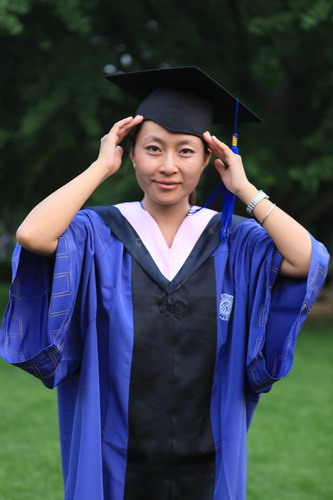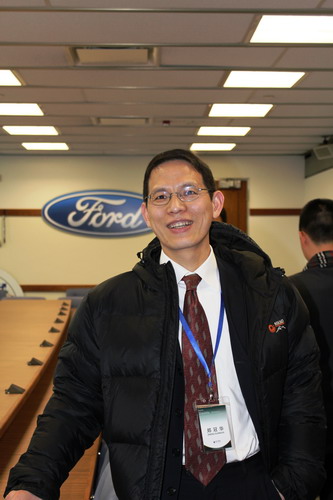|
 Graduates of a program at Tianjin University of Finance and Economics celebrate, in 2010, that they can now put "MBA" after their names. [Photo/provided to China Daily]
|
Management course continues to flourish, Yu Ran and Wang Hongyi report from Shanghai.
Zheng Guanhua is not a typical Chinese MBA student. He is 41, manages the cargo terminal at Wenzhou airport and intends to stay with his employer.
But he wants to gain "professional, practical knowledge on management to further contribute at work". So he says it is worth his effort, money and time - including a weekly five-hour commute by bullet train - to attend part-time classes for 30 months at the MBA Center of Shanghai University.
Master of business administration degree programs have flourished in China since they were introduced in 1991. That year saw fewer than 100 students on nine campuses. Last year, more than 35,000 students were registered in MBA courses at 236 universities.
The programs are set up to offer professional and practical training for experienced managers. Some experts say China's programs need to reduce academic focus and improve their experiential training. And some students find the business contacts they make at least as valuable as their lessons.
Whatever the shortcomings, Chinese enterprises have come to value MBAs as they hire management personnel.
The first year wasn't easy for Zheng, who still works full-time. He graduated from the Civil Aviation Management Institute of China before starting work at State-owned Wenzhou Airport Group in 1989, and he struggled to pass the MBA entrance examination.
"All the lectures and seminars in the MBA course are taught in English, mostly by professors hired from abroad, and that requires the student to understand English quite well," Zheng said. He had studied English on his own during leisure time.
But he also said, "The MBA course provides more practical knowledge on management skills compared to ordinary master's degrees, and I've learned a lot by taking the business study trip and learning from more experienced classmates."
On the one-week study trip in January, he visited Ford Motor Co headquarters in Detroit, in the United States.
|
 Eva Li was awarded her MBA in July by Guanghua School of Management at Peking University. [Photo/provided to China Daily]
|
MBA programs attract people from a wide range of academic disciplines and business sectors with at least three years' work experience. Many of Zheng's classmates are managers in foreign companies or are successful businessmen in different industries.
Core courses cover such subjects as accounting, finance, marketing, human resources and operations management. Students have the option of taking general business courses throughout the program or can select an area of concentration and focus about one-fourth of their studies in this subject.
"In the 1990s, most Chinese people didn't know what an MBA was. But 20 years later, such a business education program has become the most popular degree for Chinese students who want to make greater achievements in the business world," said Wang Hua, who is China director of AEMBA. That program, started in 2003 at Shanghai Jiao Tong University, is a collaboration between its Antai School of Economics and Management and Euromed Marseille Ecole de Management.
"China's MBA education is becoming more internationalized as more programs are run in cooperation with overseas universities," Wang said. "That's a good way to promote a global perspective."
|
 Zheng Guanhua visited Ford Motor Co in Detroit as part of his part-time MBA course in Shanghai. [Photo/provided to China Daily]
|
